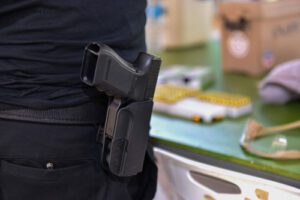 The District Court continued: No party disputes here that private property owners in New Jersey—and across the country for that matter—have long had the right to exclude firearms from their properties. As discussed above, New Jersey’s attempt to craft how private property owners communicate the word “no” works, in effect, to deter a law-abiding citizen who has a permit to conceal carry from exercising his constitutional right under pain of criminal prosecution.
The District Court continued: No party disputes here that private property owners in New Jersey—and across the country for that matter—have long had the right to exclude firearms from their properties. As discussed above, New Jersey’s attempt to craft how private property owners communicate the word “no” works, in effect, to deter a law-abiding citizen who has a permit to conceal carry from exercising his constitutional right under pain of criminal prosecution.
The Court agrees with the observation the Antonyuk court made with respect to the comparable New York law; through this provision, the State of New Jersey is in effect making a decision for private property owners that they are perfectly able to make for themselves and have done so long before the passage of this legislation, “as well as arguably compelling speech on a sensitive issue.” Accordingly, for all of the above reasons, at this stage Plaintiffs have met their burden of showing that they will likely succeed in proving that this provision is unconstitutional.
5. Section 7(b) – Functional Firearms in Vehicles Pursuant to Section 7(b) of the statute, a vehicle is essentially a prohibited sensitive place “unless the handgun is unloaded and contained in a closed and securely fastened case, gunbox, or locked unloaded in the trunk of the vehicle.” 2022 N.J. Laws c. 131. First, the Second Amendment’s plain text covers the conduct in question (carrying a concealed handgun for self-defense in public). As a result, Defendants must be able to rebut the presumption of protection against this regulation by demonstrating that the regulation is consistent with this Nation’s historical tradition of firearm regulation. Defendants contend that where the government is a proprietor of a vehicle, it has a right to exclude firearms. But the provision is not limited to government.
The Court is also not persuaded by Defendants’ argument that the requirement to carry firearms in vehicles only when unloaded, locked, and in the trunk does not wholly restrict the right to carry, given that “individual self-defense is the central component of the Second Amendment right.” Bruen, 142 S. Ct. at 2133. According to Defendants, motor vehicles pose different problems than Founding-era modes of transport. The speed and distance which modern motor vehicles can travel make them facilitators of escape in gun crimes, and their speed has created the need for police to enforce speed limits, exposing officers to danger whenever they approach a vehicle at a traffic stop.” [State’s Br. at 33.] But again, Defendants are asking this Court to engage in a balancing of interests and usefulness inquiry that the Supreme Court has expressly indicated this Court cannot do.
The Defendants’ argument is also illogical. That vehicles can be used to facilitate escape in gun crimes has nothing to do with whether a law-abiding citizen should be allowed to carry their firearm in their vehicle for protection. If anything, they would need their firearm for protection against other drivers who are committing gun crimes.
